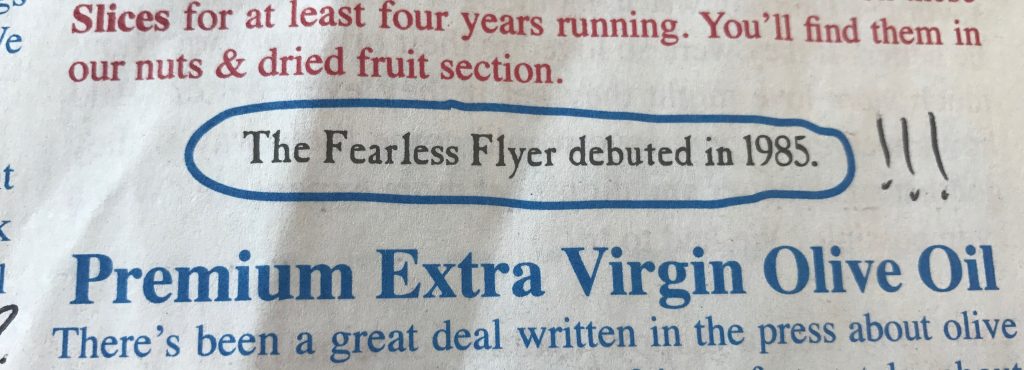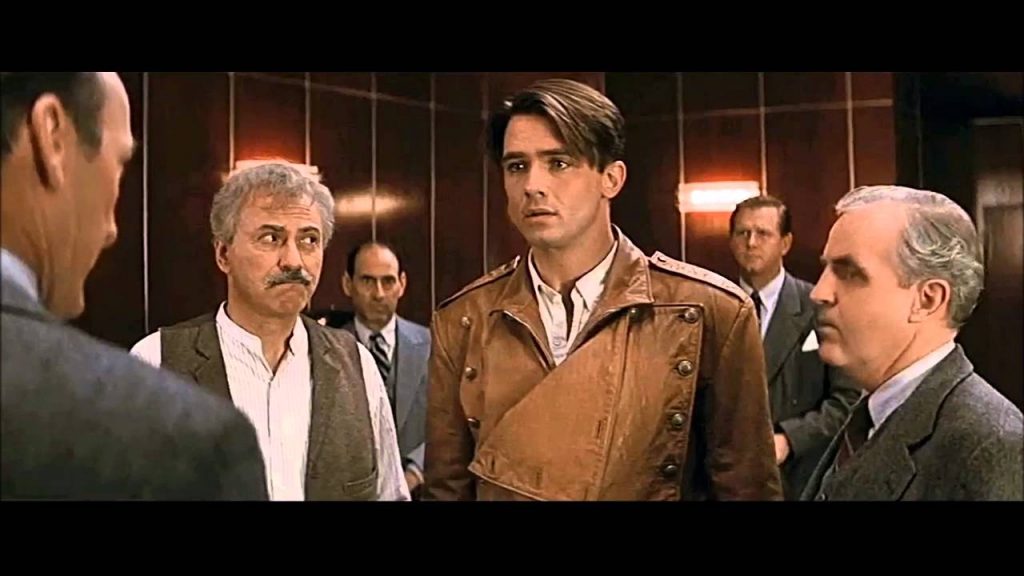Trader Joe's is 50 and its "Fearless Flyer" is 32

Let’s not bury the lede here: Fearless Flyer is my actual earthly nemesis. According to this month’s FF, the periodical debuted the same year that I did (1985) and it is self-aware, just like me (see below for printed proof). And just like any star-crossed pairing, we are bound by something deep and vital. Obviously the reason I give this sweet and well-meaning but utterly cringeworthy publication any attention is evidence of my own deepest anxieties about myself and probably my own writing. And also my cheapness.
Like Harry and Voldemort, the “Fearless Flyer” and I are somehow inextricably linked. Whenever the “Fearless Flyer” is somewhere in the vicinity, I begin to have a searing headache. I experience an almost blinding pain, and when it’s bad it’s especially, paralyzingly bad. But also just like Harry, I contain a piece of the evil that lurks within the “Fearless Flyer”; this is why I recognize it, and this is also why I can never bring myself to destroy it (I have every copy I’ve ever written about at the Awl HQ).
Sportscaster Walks
“In its current state, there are some real dangers: broken limbs, wear and tear,” Cunningham said. “But the real crux of this is that I just don’t think the game is safe for the brain. To me, it’s unacceptable.”
The twilight of football has long been upon us, but there is a very long way to go indeed. What comes after early, protective retirement? Ed Cunningham, an ESPN football analyst who resigned citing ethical concerns over the sport, has two sons, ages 3 and 5. Will they ever be allowed to play? It’s time to start asking.
How Bruckner Brought The Symphony Back to Life

As summer draws to a close and I go insane the way I do every single August, I thankfully remembered this past week that I am a mere month away from the beginning of my symphony subscription. This was a birthday gift I bought for myself that I’ve had to wait almost six months to redeem. In late September, the first concerto I’ll go see is Bruckner’s Symphony No. 4 which, you know, we’ll get there when we get there. So this week let’s look at Bruckner’s Symphony No. 7 (Daniel Barenboim, Chicago Symphony Orchestra).
It’s possible you have no idea who Anton Bruckner is. That’s perfectly okay! I will admit to you that outside of name alone, I had never knowingly listened to or played his music. I very stupidly thought he was English? Look, I don’t know. A big thing to remember about this column is that I am just a huge moron with access to Spotify and Google Docs. Anyway. Anton Bruckner (first name actually Josef… are you one of those people who goes by your middle name? Why? Tell me) was an Austrian composer, living in the shadow of the likes of Wagner and Liszt, a contemporary and sort of enemy of Brahms, who lived from 1824 to 1896. His legacy was complicated and strange: he began in religious music before “pivoting” (internet phrase) to symphonies, a form altogether considered dead by the time he took it up, and did not achieve fame until very late in his life.
His music was also celebrated by—please insert an extremely long sigh here—Adolf Hitler and the Nazi party. In fact, it was this symphony, Symphony No. 7’s Adagio that was played on the radio when Hitler died. Uhhhhh… how about don’t do that??? It should go without saying that this column does not endorse Nazis, and that I am going to look at this piece outside of that context before it does not matter to me. It was not as if Bruckner wrote in his will, “please give my music to Hitler” or his dying words were, “I want this music to be taken out of context and given to the world’s worst people.” So. Okay.
'The Rocketeer' Is the Most Relevant Movie of 2017

The Rocketeer is a 1991 superhero movie put out by Disney, which makes it an amusing echo of our current era so dominated by Disney-distributed blockbusters of the Marvel persuasion. It’s even directed by the guy who made Captain America: The First Avenger. This, however, is not why it’s the most relevant movie of 2017.
Yumi Zouma, "Persephone"
It’s autumn, the sun is shining and there’s another single out from the terrific new Yumi Zouma record. What more could you ask for? (I know, I know. You and me both. But it’s not going to happen and you need to just accept that.) Enjoy!
New York City, August 28, 2017
 ★★★★ A little gust of breeze distinguished the cool, dazzling morning from the string of previous cool, dazzling mornings. A storefront flag flapped noisily. The breeze kept on gusting, down Fifth Avenue, under white clouds on a strange unsaturated blue. Even when the sun was shining freely, the warmth was slightly out of reach. In the evening, in the sky above the food cart, thin pebbly clouds slid over Broadway from west to east, while smoother ones moved east to west above them.
★★★★ A little gust of breeze distinguished the cool, dazzling morning from the string of previous cool, dazzling mornings. A storefront flag flapped noisily. The breeze kept on gusting, down Fifth Avenue, under white clouds on a strange unsaturated blue. Even when the sun was shining freely, the warmth was slightly out of reach. In the evening, in the sky above the food cart, thin pebbly clouds slid over Broadway from west to east, while smoother ones moved east to west above them.
What Should You Get On Your Bagel?
Martin Bergman, author of the greatest ode to Brand New ever published, has some advice.
The Miracle Vine

Image: Katie Ashdown via Flickr
In Georgia, the legend says
That you must close your windows
At night to keep it out of the house.
The glass is tinged with green, even so.
—“Kudzu,” James Dickey
At the 1876 Centennial Exposition in Philadelphia, Alexander Graham Bell revealed his telephone to the world. The Sholes and Glidden company displayed the first Remington typewriter, Heinz launched its ketchup, and Charles Elmer Hires introduced Root Beer. There were over two hundred structures housing 30,000 exhibitions including elephant-sized cannons, a 1,400-horsepower steam engine, and the right arm of the Statue of Liberty. But according to the journal American History, the exhibit that drew the most “ooohs” from the cosmopolitan crowd of ten million was a garden display of a fast-growing Japanese vine. With leaves the width and shape of a human palm, the evergreen produced conical clusters of spring flowers that were the color of plums and smelled like red wine. As of today, kudzu has spread to 32 states and Canada.
It is called the foot-a-night vine, the cuss-you vine, the vine that ate the South. It has leapfrogged the Rockies and taken up home in Washington and Oregon. An end-of-the-millennium issue of Time Magazine in 1999 called kudzu’s introduction one of the hundred worst ideas of the twentieth century, along with Prohibition, telemarketing, DDT, and “The Jerry Springer Show.” Yearly estimates for kudzu costs in the United States range from $50 to $500 million in lost crops and control methods, increasing around $6 million a year.
Tuesday Is The Bad Day

Tuesday is the bad day.
Most days have their merits, their flaws, but Tuesday comes out the sullen loser.
The void visits on Tuesdays.
Sunday has the stench of lost leisure and approaching responsibility. It’s a cloudy dread born in grade school and never dissipated. But Sunday has a higher chance of horizontal time wasting. Maybe even something wholesome, like mowing the lawn, clippings clinging to your socks, gasoline hands, the faint smell of aluminum as you open a Coors Banquet, sun gone, maybe if you’re lucky the good, bright bugs are around.
While mowing is wholesome, visiting a home and garden store on Saturday is not. It is one of Saturday’s rare evils. Otherwise, Saturday gets off light. It’s cookouts and celebrations, parks and parties. It can be seemingly endless; Friday’s revelatory glow and Sunday’s rest stretching it at both ends.
Mondays are typical. Adjustment. Letting go of the weekend. But, largely, projection—assumed unease for the week’s exhaustion, for the tedium to come. Mondays rarely differ, nearly everyone detests them, yet thankfully not many people try to pike a personality on it like enjoying coffee, the world’s most popular drink, or being a nerd, as everyone is a nerd, even jocks (they’re nerds for sports, dummy).
Well, there is one personality rooted in the disdain for Monday, and it’s Garfield. And Garfield? He’s good.
When Tuesday arrives you have now already suffered the barbs of that tedium, experienced the cuts that will continue, the pain still fresh on your skin. And your awful worrisome brain is reminding you that you have four more days of this. Get used to the sting.
Tuesday is stuck. That heavy weight of Monday is pressing on your shoulders and everyone else’s too, with Wednesday, the halfway point, in sight yet far from reach.
Tuesday drags. Tuesday is dull in indescribable ways. If traffic were a day it’d be Tuesday.
Tuesday was briefly exciting. Once, it was venturing to Wherehouse or Tower Records. New CDs came out on Tuesdays. They don’t do that anymore. Tuesday is aging.
Not to get too nostalgic about CDs or anything. CDs are pretty stupid.
Wednesday, as mentioned earlier, is largely considered the halfway point. Often times the worst thing that happens on Wednesday is that some crass individual will call it “hump day.” There are usually enjoyable, light events on Wednesdays.
Thursday has a nice feel to it. I want to hold Thursday in my hand like a baseball. Friday is so close that you can feel it. In recent decades Thursday nights have even rivaled Friday nights with regard to drinking, partying, having sex. And we need that. A lot.
Well look who it is, everybody’s favorite buddy, Friday. Friday needs no explanation. It is the exhale. The citizens thank God when it is Friday.
Maybe I have made Tuesday my own monster, soiled one innocent day of the week to fill with all the bad, the clumps of anxiety, big and small. I take it in one hard swing across the jaw, get it over with, wash on Wednesday.
Or maybe Tuesday is just piss on its own. In Greek mythology a god would turn you into Tuesday as punishment for squandering opportunity.
It’s not clockwork. Sometimes Tuesday comes on a Thursday. Or between days, between sheets. But I know when it’s that Tuesday feeling—a soft horror humming in my face.
Also? Tuesday is Election Day, which is the failed orgasm of hate-sex.
Fuck Tuesday.

